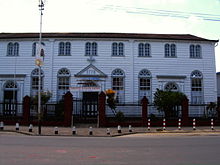Christoph Kersten
Christoph Kersten (born November 15, 1733 in Staats ; † February 5, 1796 in Gnadau ) was a missionary of the Moravian Brethren and namesake of the company founded in 1768 in Suriname, South America .
Life
Kersten was born in the Altmark as the son of a village school teacher and sexton . After school he left home at the age of fourteen and began an apprenticeship as a tailor two years later . After completing his training, he tried to earn a living as a migrant worker.
Evangelical Brethren
At the age of 25 he came into contact with the Moravian Brethren in Barby and was accepted into this religious community in 1758. Here he worked for seven years as a clerk and house servant in the shared apartment of the unmarried fellow believers. Were as brothers in 1765 for missionary work sought, came forward Kersten and he was together with two other co-religionists, Krohn and Schmidt, to Suriname appointed . The Herrnhut Brothers Congregation had been active here in mission since 1735.
Suriname
Since the Moravian missionaries first had to secure their livelihood, the three were given the task of setting up a tailor shop in the capital Paramaribo . In addition to earning a living, they should try to proselytize slaves .
Just three weeks after the appointment, Kersten, Krohn and Schmidt left Herrnhut for Zeist and Amsterdam , where they boarded a ship to sail to Suriname.
Mission company
In January 1767, the Brethren was able to auction a large corner piece of land with a detached two-story wooden house and a few outbuildings for around 4,000 Surinamese guilders. The property was on the then city limits of Paramaribo, today's Maagdenstraat and Steenbakkerijstraat. There was more space here in the big house. a. for tailoring with warehouse and shop. On June 29, 1768, the purchase contract was signed and Christoph Kersten, who had recently taken over the management of the tailoring, became the owner of the property on behalf of the Brethren. This laid the foundation for the mission company. The company C. Kersten & Co. NV naamloze vennootschap , equivalent to a stock corporation, is the oldest company in Suriname that still exists today, known simply as CKC.
Marriage, bushland
The head of the tailoring shop, Christoph Kersten, married the widow Anna Maria Paulsen, née Tonn, who was ten years older than him on January 29, 1769. Anna Maria, who was born in Zedkittel, in Moravia on the border with Bohemia , was accepted into the congregation in 1742. In 1767 she and her first husband had been called to serve as a missionary among the Marrons in Suriname in Zeist . Her husband died here in September 1767.
After the marriage, the Kersten couple prepared for the arduous journey across Suriname with its rapids, cliffs and waterfalls to the Kwama mission post, where missionary work among the Saramaccans had started a few years earlier . Their stay in the bushland under the Saramaccans was to last from 1769 to 1776 with interruptions. Here the struggle for daily survival cost a lot of energy and the actual goal of conversion was crowned with little success. A moment of joy in her missionary life was when, on January 6, 1771, Alabi (also Arabi), the first Marron was baptized in the name of Johannes. He was the son of the Saramaccan tribal chief Abini, who died in 1767.
Paramaribo
In 1776 Christoph Kersten received the news that he had been appointed President and therefore head of the entire mission in Suriname. This meant that he had to return to the city with his wife.
On July 21, 1776, the first slave in Paramaribo, the 45-year-old Cupid, was baptized. He was employed by the missionaries as a tailor's assistant and was given the name Christiaan.
Under President Kersten, the first small slave church was inaugurated on May 31, 1778 on the Steenbakkerijstraat, where the Great City Church is today. In the same year seventy slaves were baptized and the small church had to be expanded after a short time.
During these fertile years for the Moravian community, Kersten also bought another neighboring property for the Brothers of Congregation, and business activities were expanded to include a bakery.
The year 1780 brought little good news. Brother Kersten became seriously ill and suffered from paralysis for a year. War also broke out between England and the Republic . This event also had an impact on the colony. The country was put into defense readiness, many people fled from the city to the plantations, food became considerably more expensive, as almost no ships from Europe arrived. For the mission, this also meant that they hardly received any letters and reports from home and that no new staff were arriving.
return
Because of Brother Kersten's poor health, after almost nineteen years of missionary work in the tropics, the couple asked for her replacement and return to Europe. On April 5, 1784, they left Suriname in the company of the free negro Cornelius Schipio (also: Scipio), who had been baptized by Kersten and who made the trip to Europe at his own expense.
With the approval of the Moravian management, the couple moved to Gnadau. They lived together here for twelve years before Christoph Kersten died in 1796. Anna Maria died on April 1, 1807 at the age of 84.
Web links
- Website of the company Kersten (CKC) (English, Dutch)
literature
- Albert Helman : Zaken, zending en bezinning. C. Kersten & Co. NV (Ed.), Paramaribo 1968.
- Maria Lenders: Strijders voor het Lam. KITLV Uitgeverij , Leiden 1996, ISBN 90-6718-095-5 .
| personal data | |
|---|---|
| SURNAME | Kersten, Christoph |
| BRIEF DESCRIPTION | German missionary and company founder in Suriname |
| DATE OF BIRTH | November 15, 1733 |
| PLACE OF BIRTH | State |
| DATE OF DEATH | February 5, 1796 |
| Place of death | Gnadau |

